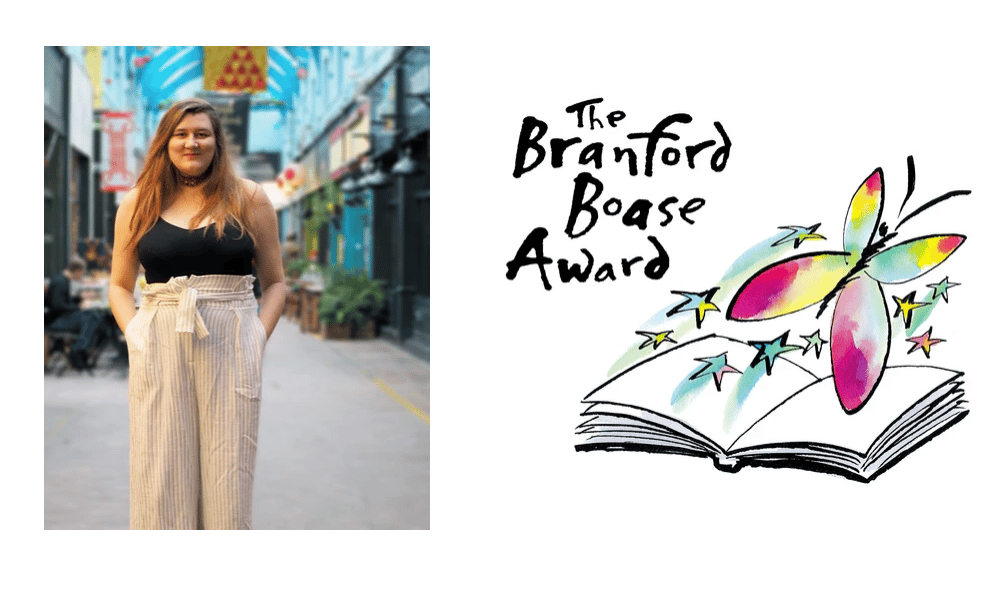We are thrilled to welcome to the blog Elle McNicoll, whose debut book A Kind of Spark has been shortlisted for the 2021 Branford Boase Award.
Read our interview with Elle to find out what’s special about being shortlisted for this award, how she came to write about neurodivergent characters and what she wishes to see more of in the world of children’s books…
Author Q&A
with Elle McNicoll, author of A Kind of Spark (available here)
Firstly, congratulations on A Kind of Spark being shortlisted for the 2021 Branford Boase Award, which celebrates debut authors and their editors. How does it feel to see the book on this shortlist?
It feels incredible. Making the longlist felt like a really glorious moment after what I think it’s safe to say was a very difficult year to debut. Making the shortlist feels pretty remarkable. It’s the only time in my career I’ll be eligible so it’s a nice milestone. I’m also so happy for Eishar, and all the editors, as they really deserve the recognition.
Can you tell us a bit about A Kind of Spark and what inspired it?
It’s a story about a girl called Addie who lives in a small and sometimes eccentric town. One day, she discovers that they were responsible for many witch hunts and trials back in the day, so she decides to campaign for a memorial in honour of those “witches”. She has to go up against a local parish council who are very set in their ways, as well as navigate trouble at school, her sisters at home and making new friends.
The main character, Addie, is such a fascinating narrator with a distinctive voice and a neurodivergent lens. How did the character develop when you were writing?
She was very fully-formed from the beginning. I always do a ton of character work before starting draft zero so there weren’t too many surprises. She’s very principled to the point of being unwavering, like a tree. So, that’s easy to write. She isn’t easily influenced or swayed. She knows herself very well.
There is a deep sense of authenticity in your writing. How much do the book’s characters and events represent your real-life experiences?
Many of Addie’s sensory experiences line up with my own. Her difficulties in school were definitely inspired by my own. I’m probably more like Keedie than Addie, though. I wasn’t socially conscious enough as a child to campaign for a memorial. I’m making up for it now. When something in my work relates to being neurodivergent, I use my own experience so that it can remain authentic and truthful. I’m very strict about keeping all aspects of neurodiversity in my work very accurate and grounded.
Both of your books give the spotlight to neurodivergent characters, who are traditionally underrepresented in middle-grade fiction. Your stories are an amazing vehicle for developing empathy and understanding, as well as enabling more children to see themselves or their friends reflected positively in what they read. How important is seeing your books shortlisted for awards like the Branford Boase and the Blue Peter Awards in providing a platform for helping more people to better understand the nuances of life for the neurodiverse population?
It’s wonderful. I told the BBC before appearing on Blue Peter that I would be saying “I’m a neurodivergent author” on live television. That was non-negotiable. It’s an unfamiliar word to some but I was adamant. They were fantastic and totally supportive. Actually saying that on television was monumental. It’s something I never saw as a child. Or really, a young adult. Ever. Being the one to actually do it felt very overwhelming. The Blue Peter Book Award is also voted for by children, which is such an unbelievably good thing to know. That they voted for A Kind of Spark is so staggering and a vindication. Being nominated for the Branford Boase was very emotional. Especially alongside Eishar. She’s the best at what she does. Period. And I’m so proud we get to do this together, and that it’s with Spark. Awards like Blue Peter and the Branford Boase are fantastic for underrepresented authors and editors. Major awards have a lot of gatekeeping and that often keeps out a smaller press. Therefore, keeping out the most exciting and diverse work.
The Branford Boase Award is unique in the way it celebrates the crucial work of editors as well as debut authors. How did you work with your editor Eishar Brar to make the book the best it could be without losing the Own Voices authenticity?
I’m about to start working with Eishar for the third time and I’m very spoiled because I’ve never had to sacrifice one bit of Own Voices authenticity. Eishar is not your typical editorial director, or editor. She is either the most sensitive and intuitive person in publishing, or she does a great deal of work without my knowledge to understand my condition and community. Because there has never been one single snag in that regard. I still spend a lot of time as a writer educating people. Correcting assumptions and harmful stereotypes. I have never had to do that with my editor, another reason why she deserves this nomination. She is responsible for some great structural changes in both of my books, and she is always an ally when we work. She comes for my overuse of ellipses, never my identity or voice.
Publishing an (award-winning) debut book during global pandemic – and also writing your second one – has been a monumental achievement in a very difficult time. What was it like being a writer during this period – and do you think the lockdown helped or hindered your success?
It’s been hard. Really hard. For the same reason lockdown was hard for everyone in general. Mentally, it’s exhausting. But releasing two books in lockdown has been monumentally hard. If you’re lucky enough to get a good review, the bookshops aren’t open to take notice. You can’t meet readers. And everything moves on quickly. I’m really hoping I can release a non-lockdown book someday. And to actually celebrate that with people close to me. Writing is hard because I’m very observant and use those observations in a lot of my work. Being locked up and away from people makes that pool of material very shallow. I don’t know if lockdown helped or hindered. I don’t want to dwell on it too much, I’d get a bit too upset. I always try to do my absolute best and if circumstances out of my control hinder that, it’s a lot to deal with, for me. It’s an ND thing.
Your books help readers to empathise and better understand the experiences of neurodivergent children in schools. Our community of primary teachers has told us what a success the books have been in their classrooms, and about some of the brilliant discussion that the stories have provoked. What’s also fascinating is how many teachers tell us that they themselves have been deeply moved by the narratives. How do you hope that the book may have a positive impact on educators working with neurodivergent young people?
The response from teachers and librarians has been wonderful. I hope people understand that, in my life, Miss Murphy was real. She existed. She does for many marginalised people. She is not in the story as a comment on teachers or education, not at all. But her mindset exists in society and ND people live with it every day. I hope her character, and the book in general, can start a conversation about what neurotypical people can do for neurodivergent children. The latter are adapting day by day, in a million unseen ways. It would be nice for people to meet them half-way, and accommodate them. Things are improving, of course, but I still think ND people need more agency in society. That’s what I always try to do with my writing. Expose ableism and give ND people the agency to fight it. But they shouldn’t have to fight it alone.
Your publisher, Knights Of, is doing amazing work to champion diverse books. But there are so many young readers who still never see characters like themselves in the pages of their books. When you think about new children’s books, what would you love to see more of being published over the next few years?
More Own Voices authors! Writing fun, commercial books and not just trauma narratives. Big flashy deals for marginalised authors, please. They are changing the game, let’s support them the way they deserve. I’m staggered by some people’s bookshelves. I look and cannot see any of the exciting, thrilling and ground-breaking work that has broken through in the last few years. All of which is classed as diverse. People are missing out if their lists aren’t inclusive. I’d also love if publishers and literary prizes could stop pushing disability books that are about tragedy and treat neurodivergent people as burdens and side characters. They seem to love them a lot more than Own Voices work by actually neurodivergent people. It’s boring now. Time for change.
Many thanks to Elle for answering our questions!
Show Us Who You Are by Elle McNicoll is out now, published by Knights Of in paperback original, £6.99.
————–
The Branford Boase Award is a children’s book award celebrating the most promising book for children aged 7+. The award is only for children’s books written by a first-time novelist and also highlights the importance of the editor in the development of debut authors.
Find out more about this year’s award shortlist here.
———————
Where next? >
Visit our Reading for Pleasure Hub
> Browse our Topic Booklists
> View our printable year group booklists.
> See our Books of the Month.









